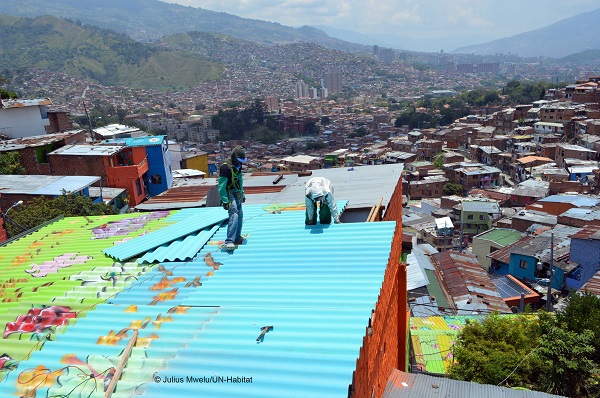 Credit: copyright Julius Mwelu, UN-Habitat
Credit: copyright Julius Mwelu, UN-Habitat
On Wednesday 27 September, the Selection Committee for the European Microfinance Award 2017, on “Microfinance for Housing”, composed of members of the Luxembourg Ministry of Foreign and European Affairs, European Microfinance Platform (e-MFP) and Inclusive Finance Network Luxembourg (InFiNe.lu), chose the three finalists who will go on to compete for the €100,000 prize: The First MicroFinance Bank Afghanistan; Mibanco of Peru; and Cooperative Tosepantomin of Mexico.
This year, the Award highlights the role of microfinance in supporting access to better quality residential housing for vulnerable, low income and financially excluded groups with no or limited access to housing finance in the mainstream sector. This problem is multi-dimensional: sub-standard housing is not just an identifier of poverty, but rather it is the cause of a host of developmental problems. Exposure to the elements, poor ventilation, and insufficient arrangements for basic hygiene are major causes of poor health. Improper building structures undermine safety and increase vulnerability to disaster. Lack of lighting and sufficient space limits children’s ability to study. Insufficient privacy and lack of toilet facilities contribute to sexual assault and constrain opportunities for women and girls. And lack of clear property rights are major contributors to crime and social injustice, while limiting families’ ability to invest in better housing.
The European Microfinance Award 2017 encouraged applications from institutions that are responding to the complex housing needs of their target clients by providing them with a variety of financial and non-financial services. This year’s Award is not limited to finance for home purchase or expansion of existing homes, but also includes the provision of access to core housing needs, such as clean water and electricity, as well as support on construction techniques, land title and resilience against natural disasters.
The three finalists provide different solutions to this complex challenge.
The First MicroFinance Bank (FMFB) Afghanistan has responded to war, natural disasters and lack of verifiable title with a home improvement loan, provided with construction technical assistance offered through a network of partner experts. Targeting rural clients and focusing on facilitating incremental building and home improvement, FMFB Afghanistan was noted for its focus on providing expert technical support and the flexibility of its loan terms, as well as the particularly challenging context in which it operates.
Mibanco is a Peruvian Bank that responds to a national housing deficit, overcrowding and poor quality building by offering three housing products, including a long-term, collateralised mortgage, an incremental home improvement loan and a water and sanitation connection product – all bundled with credit life insurance. Targeting microentrepreneurs and low-income salaried workers, Mibanco is notable for its considerable client outreach, diversity of demand-driven products, and strong partnerships with homeowners associations and construction materials suppliers.
Cooperative Tosepantomin is a Mexican cooperative that offers housing savings and loans combined with technical assistance to rural clients living in marginalised areas. Notable for its holistic approach to technical support, involving architecture planning, budgetary support and ongoing oversight of building processes, Tosepantomin was also recognised for its outstanding promotion of environmental responsibility through eco-friendly building techniques, recycling, renewable energy and energy efficiency.
The three finalists have been selected over a multi-month evaluation process, since applications opened in April, which attracted 37 applications from 23 countries. This original field was reduced to a list of ten semi-finalists, which also included Micro Housing Finance Corporation Ltd. and Swarna Pragati of India; First Microfinance Bank Tajikistan; Kenya Women Microfinance Bank of Kenya; First Finance and Amret of Cambodia; and Fundecoca of Costa Rica.
The winner will be chosen from the three finalists and announced by the President of the High Jury, His Royal Highness the Hereditary Grand Duke of Luxembourg, on 30 November 2017, at a ceremony hosted at the European Investment Bank in Luxembourg, during European Microfinance Week.
After the announcement of the three finalists, the Luxembourg Minister for Development Cooperation and Humanitarian Affairs, Romain Schneider said: “Housing is a fundamental need and a complex and multi-faceted developmental challenge. It requires a holistic view of clients’ needs, and partnership between financial institutions, governments, NGOs, technical providers and legal experts to provide access to quality and affordable housing. Multi-stakeholder partnerships are hence needed to address the growing needs for housing worldwide and in developing countries in particular. These three finalists are addressing the issue through innovation, and we are delighted that the European Microfinance Award can again highlight the excellent practice that others can follow”.








